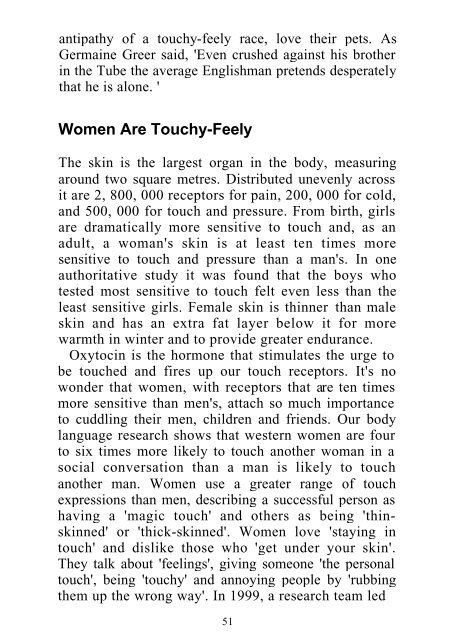- Page 2 and 3: WHY MEN DON'T LISTEN & WOMEN CAN'T
- Page 4 and 5: Acknowledgments CONTENTS Introducti
- Page 6 and 7: 4. Talking And Listening 85 The 'Bl
- Page 8 and 9: 6. Thoughts, Attitudes, Emotions An
- Page 10 and 11: 9. Men, Women and Sex 216 How Sex B
- Page 12: ACKNOWLEDGMENTS Ray & Ruth Pease, B
- Page 15 and 16: I t was a sunny Sunday afternoon as
- Page 17 and 18: opinion for fear of being accused o
- Page 19 and 20: CHAPTER 1 SAME SPECIES, DIFFERENT W
- Page 21 and 22: talking, not giving enough love, no
- Page 23 and 24: things are not equal; men and women
- Page 25 and 26: neuro scientists. The brain differe
- Page 27 and 28: Such a scenario will be familiar to
- Page 29 and 30: This book deals in facts and realit
- Page 31 and 32: concern herself with the major food
- Page 33 and 34: gay relationships into consideratio
- Page 35 and 36: T he party was already in full swin
- Page 37 and 38: The Eyes Have It The eye is an exte
- Page 39 and 40: In the UK in 1997, there were 4, 13
- Page 41 and 42: instance, show female drivers are l
- Page 43 and 44: white portions the word FLY will ap
- Page 45 and 46: man enters a room, our cameras show
- Page 47 and 48: and boys. Most males don't have a c
- Page 49: ment about her telling him to turn
- Page 53 and 54: focused on a physical task or sport
- Page 55 and 56: The X-Philes Our evolutionary roles
- Page 57 and 58: CHAPTER 3 IT'S ALL IN THE MIND 57
- Page 59 and 60: Why We're Smarter than the Rest Loo
- Page 61 and 62: Men joke that they sleep by the doo
- Page 63 and 64: Today, latest research reveals that
- Page 65 and 66: that skill. This is why it's as har
- Page 67 and 68: Specific hot spots in the brain usi
- Page 69 and 70: unrelated activities and throws a g
- Page 71 and 72: Try the Toothbrush Test Most women
- Page 73 and 74: foetus is a genetic boy (XY) it dev
- Page 75 and 76: The Brain-Wiring Test This test is
- Page 77 and 78: 8. You're in an unfamiliar place an
- Page 79 and 80: 17. When planning your day's activi
- Page 81 and 82: 27. In school how did you feel abou
- Page 83 and 84: The higher the score is above 180 f
- Page 85 and 86: CHAPTER 4 TALKING AND LISTENING 85
- Page 87 and 88: darling?' Most women are taken abac
- Page 89 and 90: The different ways the sexes expres
- Page 91 and 92: and the girls' maths and science sc
- Page 93 and 94: are pre-wired for better use of lan
- Page 95 and 96: There is no convincing evidence tha
- Page 97 and 98: dry cleaning and get the car washed
- Page 99 and 100: Fiona: 'That's good. He can be a re
- Page 101 and 102:
This is good news for men - you're
- Page 103 and 104:
multi-tracking several subjects, me
- Page 105 and 106:
Women have been the butt of jokes f
- Page 107 and 108:
trying to make a strong or forceful
- Page 109 and 110:
Indirect talk builds rapport among
- Page 111 and 112:
needs to listen effectively, using
- Page 113 and 114:
John: 'Not true! I don't always dis
- Page 115 and 116:
This is a light-hearted look at mal
- Page 117 and 118:
It is important to know that studie
- Page 119 and 120:
How a Map Almost Led to Divorce R a
- Page 121 and 122:
at which males excel, and the pursu
- Page 123 and 124:
Men are so obsessed with watching a
- Page 125 and 126:
the boys are more obsessed with the
- Page 127 and 128:
The following spatial test was deve
- Page 129 and 130:
when given verbal instructions. Thi
- Page 131 and 132:
Women, however, are impressed becau
- Page 133 and 134:
map around and feels incompetent. T
- Page 135 and 136:
woman it's just a page of irrelevan
- Page 137 and 138:
drivers had made a claim in the las
- Page 139 and 140:
equired and neither is great left b
- Page 141 and 142:
as much as the men, they'd be just
- Page 143 and 144:
the same material over and over aga
- Page 145 and 146:
are organised are the culprits. Man
- Page 147 and 148:
tional skills come more naturally t
- Page 149 and 150:
CHAPTER 6 THOUGHTS, ATTITUDES, EMOT
- Page 151 and 152:
Why did Moses spend 40 years wander
- Page 153 and 154:
in the group if the hierarchy feels
- Page 155 and 156:
Talking Dirty Women have always ass
- Page 157 and 158:
For women, emotion operates on a mo
- Page 159 and 160:
important to her that it does to hi
- Page 161 and 162:
weather and not return until he has
- Page 163 and 164:
Why Men Hang Out with the Boys For
- Page 165 and 166:
Why Stressed Women Talk Under stres
- Page 167 and 168:
The famous Rodin sculpture 'The Thi
- Page 169 and 170:
and so this is the key to getting b
- Page 171 and 172:
How Men Alienate Women If a man sus
- Page 173 and 174:
Real men do cry but only when they
- Page 175 and 176:
How to Give a Woman a Sincere Compl
- Page 177 and 178:
P eter asks Paula to go to dinner.
- Page 179 and 180:
meant to be easy ...' 'That's for s
- Page 181 and 182:
Neural evidence shows that the phen
- Page 183 and 184:
gangly-shaped toys don't. A woman o
- Page 185 and 186:
specific point, about midway throug
- Page 187 and 188:
considering sentencing for women ch
- Page 189 and 190:
Blood tests eventually revealed Bar
- Page 191 and 192:
spotted hyenas, is so high that the
- Page 193 and 194:
ties such as walking and long-dista
- Page 195 and 196:
etter engineer than one who looks l
- Page 197 and 198:
CHAPTER 8 BOYS WILL BE BOYS, BUT NO
- Page 199 and 200:
and then a second dose to alter the
- Page 201 and 202:
sion to a superior, as is also the
- Page 203 and 204:
Why People Look to the Father When
- Page 205 and 206:
The Case of Identical Gay Twins Ext
- Page 207 and 208:
ered to be ethically wrong, we are
- Page 209 and 210:
young age with testosterone, they c
- Page 211 and 212:
with male brain circuitry. As child
- Page 213 and 214:
Are we Slaves to our Biology? Scien
- Page 215 and 216:
look gay. Just witness the number o
- Page 217 and 218:
S tella and Jeremy met at the party
- Page 219 and 220:
history, however, no connection was
- Page 221 and 222:
cantly lower sex drives than men an
- Page 223 and 224:
notice on the chart that the sex dr
- Page 225 and 226:
under which the hormone cocktail is
- Page 227 and 228:
One American study found that all w
- Page 229 and 230:
Monogamy and Polygamy Polygamy is w
- Page 231 and 232:
of a moth gives it an instinctive a
- Page 233 and 234:
Male sex urge is so strong that Dr
- Page 235 and 236:
gorilla, for example, weighs four t
- Page 237 and 238:
Balls Have Brains Too Dr Robin Bake
- Page 239 and 240:
It doesn't mean that the man immedi
- Page 241 and 242:
C D What Men Look For What Women Th
- Page 243 and 244:
Why Sex Suddenly Stops The person w
- Page 245 and 246:
Men fantasise about having sex with
- Page 247 and 248:
A woman's brain is not pre-wired to
- Page 249 and 250:
achieved a result. Most men never u
- Page 251 and 252:
aphrodisiacs guaranteed to work are
- Page 253 and 254:
'How to keep him hard all night', i
- Page 255 and 256:
CHAPTER 10 MARRIAGE, LOVE AND ROMAN
- Page 257 and 258:
So, what's the advantage of marriag
- Page 259 and 260:
figure that dropped to 32% among wo
- Page 261 and 262:
position of love in the brain. Whil
- Page 263 and 264:
eason are better connected in a wom
- Page 265 and 266:
answer and this is why many women f
- Page 267 and 268:
with a man's attractiveness to a wo
- Page 269 and 270:
supermodels who look more like aspa
- Page 271 and 272:
Never forget that a woman is a roma
- Page 273 and 274:
4. Bring flowers. Most men do not u
- Page 275 and 276:
Why Men Grope and Women Don't The h
- Page 277 and 278:
Recreating Infatuation The good new
- Page 279 and 280:
CHAPTER 11 TOWARDS A DIFFERENT FUTU
- Page 281 and 282:
many of their priorities are quite
- Page 283 and 284:
If you are a woman working in a tra
- Page 285 and 286:
primary schools women now dominate
- Page 287 and 288:
Where else can you now see greater
- Page 289 and 290:
Israeli kibbutzim have for years tr
- Page 291 and 292:
The good news is that when you unde
- Page 293 and 294:
REFERENCES Allen, L.S., Richey, M.F
- Page 295 and 296:
Carper, Jean., your Miracle Brain,
- Page 297 and 298:
Gardner, Howard, Extraordinary Mind
- Page 299 and 300:
Jensen, Eric, Brain-Based Learning,
- Page 301 and 302:
McGuiness, D., 'How schools discrim
- Page 303 and 304:
Rosenblum, L. A., 'Sex Differences
- Page 305:
305



